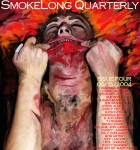You guest edited issue 8. What do you, as an editor, look for in a story? What about your own story “Feeling Sad” fits this criterion?
I think what I look for now may be very different than what I looked for when I guest edited issue 8. That was three years ago and I feel like a much different writer/person now than I did then.
The simple thing to say is that I look for stories that move me, or make me cry or laugh out loud or something, but what does that mean? I feel a bit selfish saying that because I’m just me and what do I know? Every editor is a person with a unique personality—coupled with personal experiences, they come with an embedded set of things that move them and things that don’t, but how does any one editor know what is going to move the myriad kinds of other people who are going to be reading the stuff they’re making decisions on? Is there a general set of things that move everyone, and if so, wouldn’t that have to be a rather dulled set? Should an editor choose for themselves (selfish) or for others (selfless)? The problems with both are: the selfless approach is looking for the dulled general set, while the selfish approach is choosing for an obscure, esoteric set. The selfless approach yields: you’ll probably get the attention of a lot of people, but you won’t move someone who’s privy to the experience reflected in a less popular, more obscure entertainment. But the more obscure an entertainment, the fewer people notice and so your magazine is essentially a trash can. These arguments go around and around and drive me a little crazy after a while and I’d rather just write fiction for myself these days and not worry about what’s suppose to please other people, which is why I’ve kind of given up on editoring and continue to admire those who keep at it.
Asking me to be both writer and hypothetical editor/chooser for a story complicates everything even more. ‘Feeling Sad’ was written specifically for this solicitation and was deliberately on a subject I didn’t feel qualified to write about, so from the get-go, my attempt is selfless. I’ve never really experienced a great loss in my lifetime. I feel like the whole story was one big guess on my part. Do you think it succeeds? I, as writer, think it does (but what do I know?). As editor, I don’t know, because who besides the writer does it succeed for? As writer, I remember I spent a long time on that last paragraph, trying to shape it so that the idea of happiness and sadness blur into one thing, and simultaneously the boy’s and the father’s interests blur into one thing. I think somewhere in there is where the depth exists for me, the writer. For me, the editor, to think there’s depth in that idea would be selfish. Maybe it’s too reliant on something symmetrical (happiness = sadness) and is there anything inherently interesting in symmetry? For me, the writer, yes. For me, the editor, I don’t know, I’d have to take a poll or something. As editor, I don’t think the ending hits as hard as it could because there’s a point in the middle of the story, at the end of the fourth paragraph, where it gives itself away too quickly and that takes away from the energy of the ending. The writer probably should’ve taken that middle part out or rewritten it in such a way that it doesn’t reflect the ending so much. But I’m making this decision selfishly as an editor. In the end, it’s the writer’s vision, and maybe my interpretation is not accurate. In this case, as writer, I’d probably agree with the editor at least a little. There is a difference in concept there, it’s not as complex as the ending because it doesn’t involve the hint of the father’s personality that the ending does, but I’d agree, reading it again, there’s a too similar feeling there.
You should feel sad, his mother tells him. What subtext does the word *should* carry?
I think it’s an interesting way to talk to her son, that he ‘should’ feel something, like he has an obligation to have this particular emotion at this particular time. I don’t think she really means it this way, is just kind of saying it to him the way parents say things to kids sometimes, because she wants him to be normal, to have a normal reaction. But the boy for whatever reason is incapable and interprets it with all this literal subtext. Are emotions so concretely circumstantial? I think there are certain personality types (using the MBTI,(http://en.wikipedia.org/wiki/MBTI) I see the mother as probably an IXFJ, the boy probably an INTX. The father was the extrovert of the family and kept conversation flowing, and is why everything in the story feels too calm, too quiet with him suddenly gone) that want to think this way, that emotions can be so under control that you can essentially schedule them, remaining oblivious to the fact that the emotion has now become not-emotion, an illusion of emotion.
Have the expressions of grief become cliché? For example, the boy looks longingly out the window because he believes it will help him achieve sadness.
I think the death of a parent or spouse is a tough thing to pull off in fiction, especially when it’s so immediate, and that was part of the challenge to myself to try to write it for SmokeLong. The more intense and immediate the grief, the more a certain reaction from the aggrieved is expected, and the harder it is not to fall into cliché. I think it’s why a lot of contemporary fiction tends to be about grief but like ten years later; it frees the grief from an expected reaction and allows for some creativity. But if you think about a real situation, not fiction, I think a person would actually, at some point in the grief cycle, look longingly out a window and not think to themselves, this is so cliché, I should find a more creative way to grieve. Grief is a reality that everyone experiences more or less similarly, over and over again, and redundancy always breeds cliché. A lot of truth gets thrown away because it’s cliché.
I don’t really know what that answer is trying to get at. I’m not in favor of cliché in fiction, in fact I’m probably more stoutly against it than most people, it’s more that I’m saddened when I see a truth I can’t use. I think ‘Feeling Sad’ allowed me to use the cliché in a way that was sort of acceptable because that it’s a cliché is what makes it interesting in that context. The cliché helps negate the idea of an authentic grieving.
What projects are you working on now?
I’m halfway through the first draft of a novel, which is a new experience for me, having never written anything I didn’t think was crap beyond about 5000 words, to suddenly have 30,000 along with the momentum to keep going is great.
This issue marks SmokeLong‘s fifth anniversary, which has me thinking about longevity and growth. There’s no denying the literary arena is a fickle one, with journals coming and going, writers shooting onto the scene then falling into a long hiatus, editors changing houses, agents merging, and the trends! Don’t even get me started! How do you, as a writer, endure the ups and downs? Have you experienced any setbacks? What measures have you taken to grow?
I think I have a good measure of control over my own growth as a writer and try not to let the industry, which I have no control over, influence it. It’s probably more that I don’t have a lot of desire to be a part of the industry anymore. I have a mentality of if it comes it comes, but if not, whatever. Especially when it comes to the book publishing industry, which functions differently than the academic journal industry (if that’s an industry), which functions differently than everything else below that. I don’t really want to write for a living unless I can do it on my own terms, and I’ve accepted the fact that there’s probably no contract that will ever be offered to me that can compete with my current employer. It’d be neat to publish a book but I’m not going to sacrifice my current lifestyle (ie. happiness) for it, which is a sentiment no writer should have if they’re looking for an agent, but why would I want to be part of an industry I despise in the first place? Writing’s fun so I do it. Beyond that, whatever.
A lot of what keeps me going is just finding new challenges for myself. Whatever happens to be going on in the industry is always secondary to that. I thrive on challenge, on people telling me I can’t do something. If someone tells me it’s impossible to get a story in Ploughshares, that becomes my new challenge. Writing prompts are like this for me also, is why I try to do them whenever I see them, because they’re like someone saying, I dare you to try this, or I bet you can’t do this. For a long time I put off trying to write a novel because I didn’t think I could write something that took that much sustained interest, but it turns out now to be a wonderful challenge that should keep me busy for a few years.



 The SmokeLong Grand Micro Contest (The Mikey) is now an annual competition celebrating and compensating the best micro fiction and nonfiction online.
The SmokeLong Grand Micro Contest (The Mikey) is now an annual competition celebrating and compensating the best micro fiction and nonfiction online.